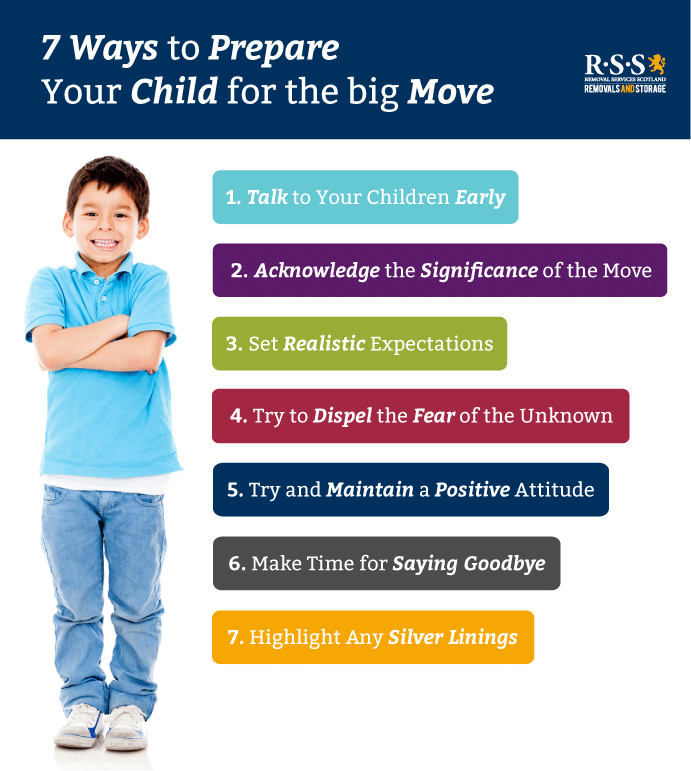Seven ways to prepare your child for the big move. If you have children, moving home can be a really difficult and traumatic upheaval for them. The impact of moving on children can be as varied as their personalities. Some children may take the move in their stride or, if you are lucky, be very excited by it!
Give them re-assurance.
Try to keep in mind that your children may not react exactly how you expect them to. Moving house is likely to be a completely new experience to them. Even if your child takes the news extremely well, they might not fully understand what the move will mean or cost them. Above all, give each member of your family reassurance that they were given careful consideration in the decision to move. As a family you will be help each other cope.
Seven ways to help prepare your child for the big move

1. Talk to your children early
Talk to your children early. You may be feeling apprehensive about telling your children about the move. Perhaps you don’t want to ruin Christmas or a birthday and you’ll know what is best for your children. However, keep in mind that telling your children early gives them as much time as possible to get used to the idea. Telling your kids early can reduce the shock of the rug being pulled from under their feet. However we understand that you may not always have the luxury of allowing the news to settle in and some moves are unavoidably sudden. If this is the case, try and give your child as much information about their new home as possible beforehand.
2. Acknowledge the significance of the move
Most of all, try to accept and acknowledge all of your children’s feelings, concerns and attitudes. Take the good with the bad. Let your children know that it is okay to feel anxious, worried or angry. While adults tend to focus on the practical aspects of a move, children of most ages will be more inclined to focus on all the losses that the move will bring. To your child, the loss of friends and familiar surroundings also comes with the loss of a sense of belonging. Expressing an understanding of their problems, can go a long way to help your children face the changes ahead.
3. Set realistic expectations
Faced with a worried child, you might be tempted to tell them that everything will be fantastic and everything will be better after the move. Try to set realistic expectations for your children. As much as you want to communicate all the positive things that will come with the move, be careful not to raise great and unrealistic expectations. Make more room for disappointment. Explain to your children that you’ll also have to make new friends in your new town or community. Explain that it might take some time to settle in and for it to feel like home.
4. Try to dispel the fear of the unknown
If possible, try to take your children to see their new home and school as many times as feasible. Children can be really frightened by the aspect of change and moving from the only home they have known can feel to them like their world is collapsing. Try to remind your children that home can be made in many places and can also be made wherever their loved ones are too. Make sure your children know that they can ask you any question and you’ll give them an honest answer. It might be a good idea to use stories or movies to help your younger children understand their situation. Finding a character your younger children can relate to might be a good way to better help them understand and cope with their feelings. If you’ll need to organise new childcare, you should look into what is available as soon as you know you’re moving. This will help familiarise your little one with their new nursery or child-minder and begin to introduce the idea of the transition before the move.
5. Try and maintain a positive attitude
During times of transition, younger children often look to their parents to understand their own feelings and can often mirror their reactions. A parent’s attitude during an emotional time can greatly affect how their child handles their own emotions. Younger children will be looking for reassurance.Esnure that you give them plenty and try to remain as positive as you can around them. However, older children may relate more to honesty and openness. It may be a good idea to talk with your older children about any worries or fears that you may have. Showing them that you have the same concerns as them can make them feel understood and allow some comfort in knowing what they are feeling is normal.
6. Make time for saying goodbye
If possible, make the time to say goodbye to the people and places you love together as a family. It could be a nice idea for each member of the family to take it in turn to choose a special place to visit as a family before the move.
7. Highlight any silver linings
To some children, a move could mean a positive new start, particularly those who might have experienced bullying or difficulty in fitting in. Help your child see that the opportunity of a new beginning could be really exciting.








